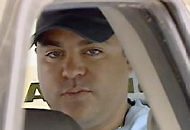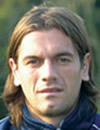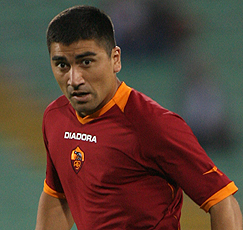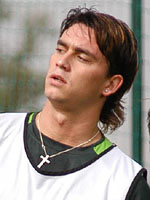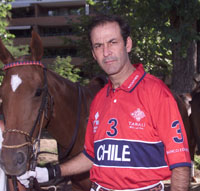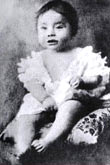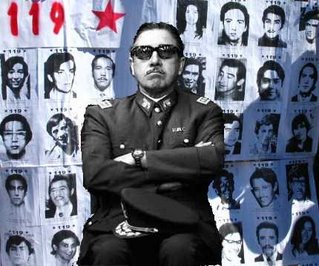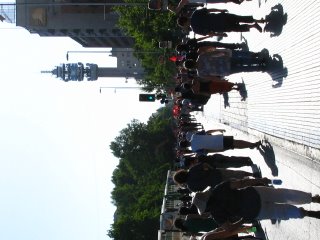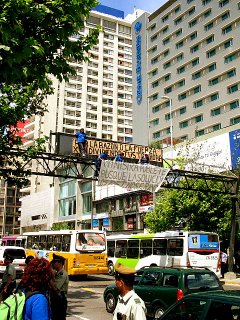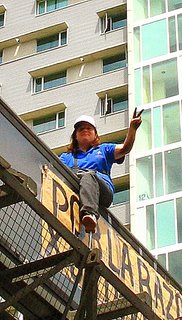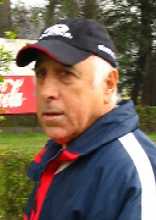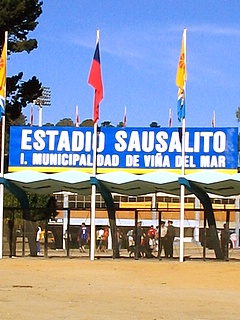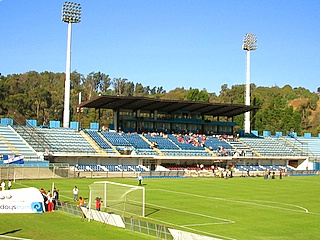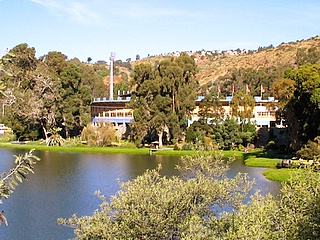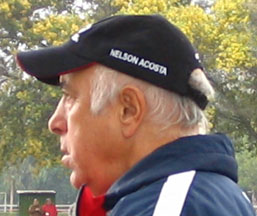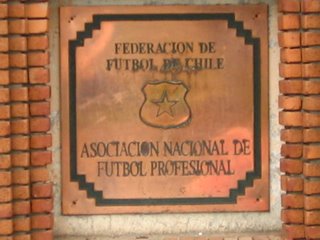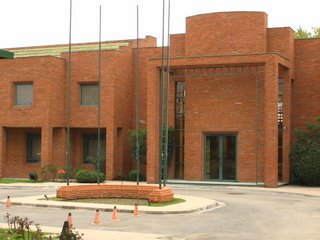Chilean Striker is World’s Top GoalscorerHumberto Suazo presented with trophy in Salzburg, Austria
Who was the top goalscorer in 2006? Ronaldinho (Barcelona)? Andrei Shevchenko (Chelsea)? Park Ji Sung (Manchester United) ? Didier Drogba (Chelsea)? No, it was none of these players. According to the International Federation of Football History & Statistics ( IFFHS), it is Humberto Suazo, a Chilean striker currently playing for Colo Colo, the champion club in that South American country and that this year was also the highest goalscorer ever in Chilean first division history, with 51 goals.
On Jan 8, the IFFHS held a ceremony in Salzburg Austria, where Suazo was presented with the trophy to the “Highest Goalscorer in 2006” with 17 goals scored in top level international matches played both for his national team and club. Suazo left behind players such as Peter Crouch (Liverpool) with 16 goals, Miroslav Klose (Werder Bremen) 13 goals and Lukas Podolski (Bayern Munich) at 13 goals.
Suazo was also awarded the IFFHS “Silver Ball” award for being the second highest goalscorer in a first division tournament. The top goalscorer was Klaas Jan Huntelaar of Ajax (Netherlands) that scored 35 times in the Dutch tournament.
According to the IFFHS, the best club in the world was Sevilla of the Spanish First Division, the Best Coach was Frank Rijkaard of Barcelona while Horacio Elizondo of Argentina was the best “Man In Black” (referee) in 2006.
You may see the IFFHS full list of top goalscorers at http://www.iffhs.de/?388d85ff0e003c4f05f68e05b85fdcdc3bfcdc0aec70aeedb8a20c
CHILEAN IS BEST SOUTH AMERICAN FOOTBALLEROn Dec. 30, 2006, Matias Fernandez, a 20 year old attacking midfielder won the annual election held among specialized journalists from South America and Europe. The election is organized by “El Pais” a Uruguayan newspaper. Fernandez was recently transferred from Chilean champion Colo Colo to Villarreal in the Spanish First division for 7 million Euros won the election with 62 votes. In second place was Rodrigo Palacio, (Boca Juniors, Argentina) with 53 votes, third was Fernando Gago, also of Boca Juniors (50 votes) and fourth was Rogelio Ceni (Sao Paulo, Brazil) with 45 votes.
Matias Fernandez is the third Chilean footballer to win the competition after Elias Figueroa (1974,1975 ,1976) and Marcelo Salas (1997). Fernandez was crucial in helping Colo Colo win its second chilean championship in a row and also reaching the final of the Copa Sudamericana in Dec. 2006 that the Chilean club lost to Pachuca of Mexico.
Colo Colo`s coach, Claudio Borghi, was voted “Best Coach of the Year” by El Pais, with 52 votes, followed by Alfil Basile (Argentina) with 50 votes, Abel Braga of Internacional (Brazil) and Luis Fernando Suarez of the Ecuador national team both got 49 while Diego Simeone, coach of the Argentinean champion, Estudiantes de La Plata got 33 votes.
According to El Pais, the South American “Dream Team” would be formed by the following players :
Rogelio Ceni (goalkeeper), Hugo Ibarra, Daniel Díaz, Juan Veron, Fernando Gago , Rodrigo Palacio, Gonzalo Higuain (Argentina), Fabao and Fernandao (Brazil), Matias Fernandez and Humberto Suazo (Chile).
Portsmouth Gets Valuable Draw against ArsenalPremier League match ends 2-2 in London
The match was held on Dec. 16 at Arsenal's impressive new "Emirates Stadium" with an attendance of 60,037 spectators. The game did not begin very well for the "Gunners" since Freddie Ljungberg was injured in the sixth minute and was replaced by Theo Walcott. Portsmouth, the surprise team of the season were happy to hang on to the draw and goalkeeper David James played a crucial role in blocking all of Arsenal's goal attempts. The match was becoming quite monotonous but came back to life in the 45th minute. Surprisingly, during one of Pompey´s few attacks, Matt Taylor took a free kick that hit the right post, and the rebound was connected by Noe Pamarot into the Arsenal net.
As the second half began, Portsmouth gave another surprise as a shot by David Thompson bounced near the Arsenal goal, and Matt Taylor scored with another spectacular volley into the top left hand corner of Jens Lehmann´s net.
In the 55th minute Arsenal coach Arsene Wenger took the right decision as he replaced Jeremie Aliadiere with Emmanuel Adebayor that brought his team back to life as he scored only two minutes later. Not only did the goal wake the fans up, but also the whole Arsenal team, that continued attacking at the Portsmouth goal and were rewarded in the 59th minute, when Kolo Toure took a hard long range shot that was rebounded by James. Gilberto Silva, Brazilian national team player and captain of Arsenal came running into the area and scored the equalizer with a low shot. Arsenal was really speeding up the pace, and this forced Pompey coach Harry Redknapp to make two substitutions, as Nico Kranjcar and Richard Hughes came on in the next fifteen minutes to slow down the action.
Gilberto Silva nearly wrapped up the match for Arsenal as he narrowly missed with a good low shot that went near the left hand post of James’s goal. The Arsenal players felt the effort of the second half and just played to maintain the result. A good result for Portsmouth that was visiting and that after this result is now in fourth place in the Premier League with 20 points while Arsenal is third with 30 points.
Arsenal: Jens Lehmann, Gael Clichy, Johan Djourou, Emmanuel Eboue (Mathieu Flamini 78), Kolo Toure, Cesc Fabregas, Fredrik Ljungberg (Theo Walcott 6), Aleksandr Hleb, Gilberto Silva, Robin van Persie, Jeremie Aliadiere (Emmanuel Adebayor 55)
Coach: Arsene Wenger
Portsmouth: David James, Linvoy Primus, Noe Pamarot, Matthew Taylor, Sol Campbell, Glen Johnson, David Thompson (Niko Kranjcar 71), Gary O'Neil, Pedro Mendes, Sean Davis, Nwankwo Kanu (Richard Hughes 85)
Coach : Harry Redknapp
Thrilling Draw Between Manchester United and ChelseaClash of Leaders at Old Trafford Ends 1-1
The match was played on Nov. 27 between the English premier League`s first placed team, Manchester United and Chelsea. At the start of the match Man. United was three points ahead of Chelsea. Both teams fielded their most powerful lineups, full of 2006 World Cup players such as Didier Drogba (Ivory Coast) that with 8 goals is the Premier League's highest goalscorer , Wayne Rooney (England) that has scored 7 times this season and Gabriel Heinze, an Argentine defender that was crucial in neutralizing the Chelsea forwards in the first half of the match . Man. Utd had a very good record at Old Trafford since it had only conceded two goals in the six matches previous home matches. The pitch was in excellent condition and helped the action to get underway at an extremely fast pace, at typical English style football. Man. Utd had taken control of the action and the 75,000 fans were on their feet in the 17th minute as Michael Ballack accidentally handled the ball outside the Chelsea area. Cristiano Ronaldo took a hard free kick that was deflected by Carlo Cudicini, the Chelsea goalkeeper, over the bar.
Manchester Utd. continued pounding at the Chelsea goal and the results came in the 28th minute as Rooney sent in a great low pass from the halfway line to Louis Saha that was in the Chelsea area. Saha turned very well and placed a low shot into the right hand corner of the Chelsea goal.
Until the goal Chelsea had not shown much attacking play, and its first chance came in the 37th minute as Geremi took a hard long range shot that was blocked by Erwin Van der Sar, the Dutch national team goalkeeper. With Shevchenko isolated from his teammates by the Chelsea defenders, there were no other dangerous attacks until the end of the first half. During the break Chelsea coach Jose Mourinho replaced Geremi with Arjen Robben to strengthen its attack and this made came onto the pitch with a more aggressive attitude and the Blues controlled play for the first 15 minutes, with Frank Lampard taking three shots at goal. Mourinho´s move paid off in the 68th minute as Lampard made a good cross from the right corner that defender Ricardo Carvalho headed into the Man Utd net. It seems that at this point Sir Alex Ferguson sensed that if the did not put more weight in defence Chelsea would overrun Manchester United and so he replaced Cristiano Ronaldo and Saha with Darren Fletcher and John O' Shea. Meanwhile as in the previous moments of the match, Didier Drogba continued to be cancelled out by the Man. Utd defense. The result of Fergusson’s defensive tactics was that Man.Utd kept its three point lead from Chelsea, but with Blues playing as they are, will it be enough of a lead for Man.Utd to win the Championship?
Starting Lineups:
Man. Utd (1) : Edwin v. Der Sar (gk), Michael Carrick, Gary Neville, Nemanja Vidic, Rio Ferdinand, Louis Saha, Gabriel Heinze, Cristiano Ronaldo, Paul Scholes, Ryan Giggs, Wayne Rooney.
Coach: Alex Fergusson
Chelsea (1) : Carlo Cudicini (gk), Geremi, Ricardo Carvalho, John Terry, Ashley Cole, Michael Ballack, Michael Essien, Frank Lampard, Claude Makelele, Andrei Shevechenko, Didier Drogba.
 INTER MILAN BEATS SPORTING AND ADVANCES IN UEFA CHAMPIONS LEAGUE
INTER MILAN BEATS SPORTING AND ADVANCES IN UEFA CHAMPIONS LEAGUEAnother matchday of the UEFA Champions League was played on Nov.22 and in Milan at the Giuseppe Meazza Stadium, the home team Inter Milan played host to Sporting Lisbon.
Several South American players were on the pitch (for Inter Hernan Crespo , Javier Zanetti,(Argentina), Julio Cesar and Maicon (Brazil) and Ivan Cordoba (Colombia) while Sporting fielded Rodrigo Tello (Chile) and Carlos Paredes (Paraguay)
Inter needed to win to qualify for the next round of the tournament. Inter Milan has yet to win the Champions League as it is today, but it has won its predecessor, the European Champions Cup in the 1963-64 and 1964-65 seasons. From the start, with some hard tackles, the Inter Milan defenders made a point to the Portuguese players that they were in for a rough match. Play went on from one end of the pitch to the other at a fast pace but the first scoring chance happened in the 12th min as Fabio Grosso, the man that scored the winning penalty in the final of this years World Cup hit a hard mid level free kick past Ricardo´s right post. The first casualty for Sporting came in the 16th minute as Marco Materazzi, another Italian hero made famous as he received Zidane´s head butt during the final against France injured Marco Caneira out of the match. Caneira was replaced by Abel and play progressed under the same pattern, with Sporting crashing time and time again with the tough Inter defense. In the 36th minute , after an Inter Milan counterattack, Crespo was left alone in front of Ricardo to volley in a hard shot into the Sporting net. Abel was yet another victim of Inter´s hard tackling and also had to leave the pitch.
During the 73rd minute of the second half, Crespo could have wrapped up the match for Inter as Grosso sent in a hard low cross from the left, as the Argentine player slid feet first into the area but missed the ball by a few inches. Grosso was replaced ten minutes later by another Argentine player, Esteban Cambiasso. Sporting´s first clear scoring chance came too late, in the 85th minute as Rodrigo Tello sent in a good corner from the left that Alecasandro headed in at close range next to Julio Cesar´s left post. During the final spell of the match the Inter defense showed that it was just too efficient for the Sporting players to defeat. Now Inter Milan has qualified for the next round of the Champions League along with Bayern Munich, the leader of Group B.
Starting Lineups :
Inter Milan (1) : Julio Cesar (gk), Javier Zanetti, Ivan Cordoba, Marco Materazzi, Zlatan Ibrahimovic, Maicon, Olivier Dacourt, Patrick Vieira, Fabio Grosso, Hernan Crespo.
Sporting Lisbon (0) : Ricardo (gk), Custodio, Anderson Polga, Tonel, Marco Caneira, Carlos Paredes, R.Tello, Alecsandro, Nani, Joao Moutinho, Joao Alves.
Results from other Champions League matches played on Nov 22 :
Celtic 1- Manchester United 0, CSKA 0 - Porto 2, Benfica 3 - Copenhague F.C -1 ,
AEK Athens 1 - AC Milan 0, Lille 2 - Anderlecht 2, Spartak Moscow 2 - Bayern Munich 2, Dynamo Kiev 1 - Steua Bucarest 1, Arsenal 3 - Hamburg 1.
CHELSEA HAMMERS WEST HAM DOWN THE TABLEBLUES WIN DERBY 1-0 AT HOME
Another intercity derby was played on Nov. 18 at Stamford Bridge, London, home ground of Chelsea, a club that is competing for a historic hat-trick of English Premier League titles. The only team in history that has been able to win three English championships in a row has been Manchester United , that incidentally is leading in the points table and is three points ahead of Chelsea. West Ham is having a dreadful season and is currently in 16th place in the championship. It was a chance for South American football fans to see two Argentine national team players such as Carlos Tevez and Javier Mascherano in action, that arrived at West Ham at the start of this season from Corinthians, the Brazilian champions. However neither have been able to show good form, and several press reports from Brazil mention that Tevez and Mascherano will return and play for Flamengo in Rio de Janeiro. Mascherano was not in the starting lineup and Tevez just cannot keep up with the fast pace of the English premier League. Tevez is a skilful player that likes to dribble a lot, but since the English style of play leaves few open spaces, he is rarely able to show all his qualities. Chelsea did not show much clear scoring chances in the first twenty minutes and West Ham even less, making the match quite monotonous. Howver in the 21st minute , the Premier League's top scorer with eight goals, Didier Drogba ran off free towards the W. Ham goal and was fouled outside the semi circle. Instants later, Cameroonian international player, Geremi scored with a well placed free kick past goalkeeper Robert Green. West Ham continued at its medium pace trying to equalize but with no clarity, only a few crosses and corners into the area where the Hammers had no players that can head the ball at goal.
In the second half the match followed the same pattern as in the first half, with Chelsea not really playing at their best level, instead waiting to see what West Ham could produce.
Didier Drogba, finally appeared in the 68th minute with his first shot at goal that went into the hands of Green. In the 72th minute Essien took a hard and low long range shot that hit the left post of the West Ham goal and went out.
W. Ham continued with its ineffective play and in the last moments of the game Tevez showed that he is not adjusting to the pace in the Premier League, as he tried to dribble a Chelsea defender that easily won the ball away from him. From then on Chelsea continued to control the match and won another three points with little effort.
Starting Lineups :
Chelsea (1) Carlo Cudicini, Ricardo Carvalho, Ashley Cole, John Terry, Michael Essien, Geremi, Frank Lampard, Claude Makelele, Didier Drogba, Arjen Robben , Andrei Shevchenko.
West Ham (0) : Robert Green , Anton Ferdinand , Daniel Gabbidon , Paul Konchesky, Hayden Mullins, Jonathan Spector, Lee Bowyer , Matthew Etherington, Nigel Reo-Coker , Carlos Tevez , Bobby Zamora
Ohter results (Nov. 18) Sheffield Utd 1 - Manchester Utd. 2
Manchester City 3 - Fulham 1
